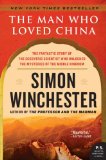Summary | Excerpt | Reviews | Beyond the Book | Read-Alikes | Genres & Themes | Author Bio
The Fantastic Story of the Eccentric Scientist Who Unlocked the Mysteries of the Middle Kingdom

Critics' Opinion:
Readers' Opinion:
First Published:
May 2008, 336 pages
Paperback:
May 2009, 416 pages
 Book Reviewed by:
Book Reviewed by:
Kim Kovacs
Buy This Book
This article relates to The Man Who Loved China
Joseph Needham's travels in China took place during the latter half of the
conflict known as the Second Sino-Japanese War - the largest war to take
place in Asia during the 20th century (map
of Asia).
The seeds of the conflict were sown during the First Sino-Japanese War
(1894-1895), at the end of which China ceded Taiwan and Korea to Japan, and
the Qing dynasty was substantially weakened (a factor that led to its collapse
in 1912 and the rise of the Republic of China). Hostilities continued
intermittently in the northern part of China until 1931, when Japan conquered
Manchuria setting up a puppet government in what they called Manchukuo.
Battles continued between the two nations, with Japan acting as the aggressor.
In China, the Kuomintang (Chinese Nationalist Party), headed by Chiang Kai-shek, was occupied with combating the Chinese Communists led by
Mao Zedong,
and the Japanese were able to take advantage of this internal strife.
Open hostilities began at the Battle of Lugou Bridge on July 7, 1937, when shots were exchanged between Chinese and Japanese troops on the outskirts of Peking (Beijing).
The Japanese army was better armed and better organized, and kept forcing the
Chinese to move their capital west. Nanjing (Nanking), the capital at the time, was captured in December 1937, forcing the Nationalist government inland 435 miles. Another defeat in 1938 prompted moving the seat of government another 500 miles west to Chungking (Chongqing).
Chiang Kai-shek's main strategy was to limit fighting, hanging back instead to hold forces in reserve for his struggle against the Communist faction. The Communists meanwhile waged an increasingly effective guerrilla war against the
Japanese in Northern China & Manchuria (and gained a great deal of popular
support in so doing).
Eventually Japan overreached. In addition to trying to hold an immense amount of
territory with limited troops, they started to grab lands in the South Pacific and, as a result, spread themselves too thinly to hold China.
After Pearl Harbor, the US and British began providing loans, supplies, and an increasing number of advisors to China, affording much-needed relief to the Chinese people as Japan diverted its armies to the Pacific Theater.
Japan capitulated in August 1945 after the dropping of the atomic bomb, its soldiers in China officially surrendering on September 9, 1945. Manchuria, Taiwan and the Pescadores were returned to Chinese control. Four years later, the Kuomintang led by Chiang Kai-shek retreated from mainland China to Taiwan while continuing to claim sovereignty over all of China. Meanwhile, on the mainland, the victorious Communists established the People's Republic of China and, to this day, claim Taiwan as part of China.
The casualties during the war (1937-1945) were staggering: The Japanese recorded around 1.1 million military casualties, wounded and missing. The Chinese suffered much worse, losing approximately 3.2 million soldiers. 9.1 million civilians died in crossfire, and another 8.4 million were recorded as non-military casualties.
Filed under People, Eras & Events
![]() This "beyond the book article" relates to The Man Who Loved China. It originally ran in May 2008 and has been updated for the
May 2009 paperback edition.
Go to magazine.
This "beyond the book article" relates to The Man Who Loved China. It originally ran in May 2008 and has been updated for the
May 2009 paperback edition.
Go to magazine.





The Funeral Cryer by Wenyan Lu
Debut novelist Wenyan Lu brings us this witty yet profound story about one woman's midlife reawakening in contemporary rural China.
Your guide toexceptional books
BookBrowse seeks out and recommends the best in contemporary fiction and nonfiction—books that not only engage and entertain but also deepen our understanding of ourselves and the world around us.